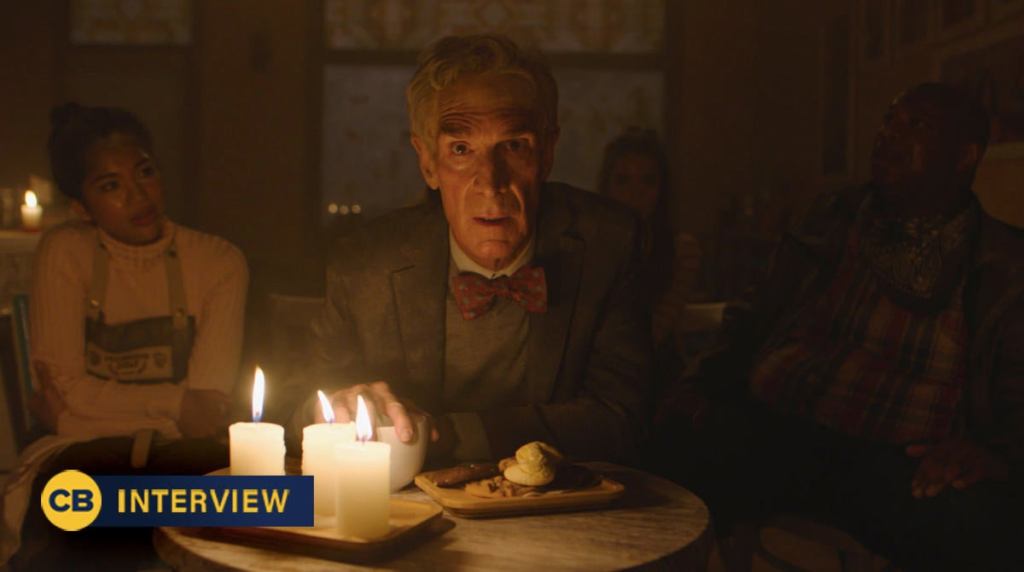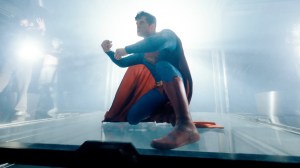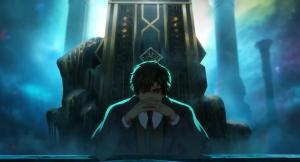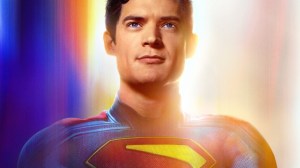Bill Nye followed in the footsteps of Don “Mr. Wizard” Herbert in the early ’90s, using a TV show to introduce young audiences to the excitement and intrigue of scientific pursuits. Decades after his Bill Nye the Science Guy TV series, Nye remains a fixture of the scientific community, often using social media to help enlighten followers about pressing issues, though his new Peacock series The End Is Nye is exploring another teachable avenue. Given the troubling denial of science from people making important decisions about the planet, Nye both envisions worst-case scenarios of disasters the Earth could face, while also using his signature wit and wisdom to demystify such catastrophes, along with highlighting ways the viewer can take active preventative measures in hopes of avoiding such tragedies. The End Is Nye premieres on Peacock on August 25th.
Videos by ComicBook.com
The End Is Nye sends Bill Nye into the most epic global disasters imaginable — both natural and unnatural — and then demystifies them using science to show how we can survive, mitigate, and even prevent them. The series is hosted and executive produced by Emmy Award winner and renowned science educator, engineer, author, and inventor Bill Nye. Each episode also features a brief cameo by longtime science advocate and series EP Seth MacFarlane.
ComicBook.com caught up with Nye to talk his new series, climate change, and suspending his disbelief for sci-fi stories.

ComicBook.com: In this series, there’s so many different topics that are covered throughout the season. There’s so many really important discussions that it’s surely going to ignite. When you look at this season, was there either one episode that inspired the whole concept of the series that you were most connected to or is there one episode that, if audiences watch only one, that’s the one that they’ve got to watch?
Bill Nye: Well, they’re all great. But there was a moment when we were creating the show. We were in Brannon Braga’s backyard, Brannon Braga worked with Seth MacFarlane to create the modern versions of Cosmos, he created Salem and he wrote some Star Trek: Voyager, this and that, Star Trek movies.
We were talking about what was going to happen in this show, where we had a bunch of floods, in one of the episodes. I did this bit of physical comedy. It’s all COVID, we were sitting very far apart in the backyard, outdoors, and I grabbed onto this fence post and pretended to get washed away. Then we all realized, “That’s an idea. Let’s kill the guy in every show. Let’s kill Bill Nye in every show.” So that’s what we did.
In the end of the first half hour, we kill me. But then I come back. The optimistic view of the future with science, we can change the world. And that was a cool moment, actually. That was really a moment of agreement. This is what we’re going to do.
So people should tune into every episode to watch you die as often as possible.
Yes, that’s right. Now, I’m not going to tell you how I get killed in each episode. Six disasters, six different deaths.
I think a lot of people, when we’re struggling with seeing climate-change deniers, politicians and pundits showing off these “acts of cow,” as you describe in the show, we look to you for some sense of optimism. So for you, what is your own self-care? What do you do when you are faced with these cynical, denials of facts of science?
Well, the big thing I think for anyone is to take action, to feel like you’re doing something. When you feel this anxiety, you’re going to do something. And just confronting climate deniers, especially on the TV, I feel like I’m doing something.
But the other big thing I tell everybody is vote. Got to vote. Take the environment into account when you vote. Take the future into account when you vote. And if you’re too young to vote, make sure all the grownups in your life vote. Seriously.
Since the beginning of your career with your first TV show, you’ve expertly walked this line of entertainment and education and they’re just seamlessly blended together. I personally love sharks, that’s my thing, so anytime I see sharks misrepresented in fiction, I just can’t tolerate that movie or TV show. For you, do you feel you’re personally able to consume pop culture the same way that your average audience does, or is the science of the fiction always distracting for you?
Good science fiction is good science fiction, like The Martian. The Martian, it starts where the Martian wind blows a rocket over. Well, that’s very, very unlikely. The atmospheric pressure on Mars is barely 0.7% of the atmospheric pressure on Earth. But a science fiction story, you got to start somewhere. So I like that. I love that.
On the other hand, there’s a whole channel devoted to looking for ghosts and getting messages from beyond, from dead people. That does not happen. There are no ghosts. There’s no messages from beyond, dead people. So, cut it out. So the answer is absolutely … it depends.
That’ll be the headline. Bill Nye says, “Absolutely … it depends.”
Without question … it depends.
Since you are such a well-known figure in the scientific community, you’ve done things where you’re cameoing on The Big Bang Theory, A.P. Bio, you’re doing Scooby-Doo. Is there a franchise or is there a property that you love, that you’d love to drop by a Star Trek episode? You’d love to pop up in a Marvel show as a talking head?
Oh, man. Seriously, I love all of those things. But you don’t pop up, you get asked to pop. They come to me. I don’t say, “Hey, I want to host Saturday Night Live. Move over.” It’s not like that.
But on The Big Bang Theory, I was on with Bob Newhart. And there’s this moment where, looking at it from my point of view, I’m supposed to out-deadpan Bob Newhart. That’s not going to happen, people. That was too high a bar, but it was cool. That was just big fun, being on there. I was on there twice.
To be fair, now I can’t help but hope to see you pop up on one of these ghost-hunting shows, just so every time they turn to you, it’s just, “This isn’t happening. This is not real.”
“Nope. That red light is not a ghost. You left the battery pack over there and it’s charging. It’s not a ghost, sorry.” I’ll sleep in the graveyard, if I got a nice tent and security, sure. But there are no ghosts. So far as we can tell, there’s no psychic anything. People who find water with fork sticks, find it because they’re experienced at finding water, not because they have psychic powers with a wooden stick. Or metal stick, or whatever.
Your first show was foundational in instilling the importance in science in myself as I was growing up. What excites you about younger generations of science enthusiasts? What’s super exciting to see among young science fans?
They’re going to do something about all these problems. They’re not going to stick their heads in the dry, or soaking wet sand, depending where they are. No, they’re going to get it done. They’re not going to be in denial. And every young person, with very, very few exceptions, is concerned about their future, is concerned about climate change, about energy production, about fairness, social issues.
When life is unfair, that leads to trouble. And the people being treated unfairly don’t like it, for some reason. So I’m very excited about the future because young people are going to get ‘er done. Climate deniers are going to age out, as I like to call it. Also known as “dying” and that will leave young people in charge.
It’s a relief to know that they will go extinct.
That’s right. Sooner or later. No, really. It’s a real thing.
The End Is Nye premieres on Peacock on August 25th.
This interview has been edited for length and clarity. You can contact Patrick Cavanaugh directly on Twitter.








